七年级英语上册功能意念
初中英语功能意念项目表

初中英语功能意念项目表————————————————————————————————作者:————————————————————————————————日期:2初中英语功能意念项目表功能问候提示回答Hi!Hello!Good morning/ afternoon / evening. How are you?Please say Hello to your parents. Please give my best love /wishes to Lucy.Hi!Hello!Good morning/ afternoon / evening.I’m OK. / fine, thanks. And you?/ very well, thank you.Sure. / all right功能介绍提示回答My name is Jim.I’m a student.I’m from England.This is Mr. / Mrs. /Miss/ Ms Brown. I’d like you to meet Bob.Hello.How do you do?Nice / glad / pleased to meet( see ) you.功能告别提示回答Good bye./ bye / Bye-bye.Good night.See you later/ then / tomorrow/ soon.I am sorry I have to go now.Good bye./ bye / Bye-bye.Good night.See you later/ then / tomorrow/ soon.功能感谢提示回答Thank you (very much). Thanks a lot.Thank you for your help. It’s very kind /nice of youThat’s OK /all right. You’re welcome. It’s a pleasure.3功能道歉提示回答Sorry.I’m sorry.Excuse me, please.I beg your pardon.I’m sorry (that ) I am late.That’s OK.It’s all right. Never mind.It doesn’t matter. It’s nothing.功能邀请提示回答Would you like to go for a walk?May I invite you to dinner?What / how about having a swimming?1.OK.Thank you.Yes, I’d love to.That would be nice.2.no, thank you.It’s very nice of you, but my mom is ill. I’d love to, but I have no time.I’m sorry I can’t .功能请示允许提示回答May I come in?Can / Could I use your telephone? Would /do you mind if I open the window?1.Yes, please.Sure.Certainly.That’s all right.Of course, you can.2.I’m sorry , it’s not allowed. I’m afraid not.You’d better not.功能祝愿和祝贺提示回答Have a good day/ time /journey/ trip. Good luck.Thank you. You, too.4Enjoy yourself.Best wish to you.Happy New Year.Merry christmas.Congratulations.Well done.The same to you.功能提供帮助提示回答Do you want me to clean the room? Can I help you?What can I do for you?Let me take your bag.1.yes, please.Yes, thanks.Thank you. That would be nice/ fine.Than you for your help2.No, thank you/ thanks.Thank you all the same.That’s very kind of you. But I can do it myself.功能约会提示回答Will you be free tomorrow?Do you have time this afternoon? How about tomorrow morning? When / where shall we meet? Could we meet at 4:30?Let’s make it 4;30.1.Yes, I’ll be free then.All right. See you then.2.I’m afraid I have no time then.Sorry , I won’t be free then, but I’ll be free tomorrow.功能打电话提示回答Hello. May I speak to Tom? Hello. I’d like to speak to Mr. Green.Is that kTom speaking?1234567,please.Can I leave a message?I’ll call back later /again.Hello. This is Tom speaking.Hello. Who is this?Hold the line, please.Just a moment, please.Hello. Who’s speaking?Sorry , he/ she isn’t here ri ght now.5I’ll ring him / her up again.Can I take a message?I’m afraid you have the wrong number.功能就餐提示回答Would you like something to eat/ drink?What would you like( to have)?Would you like some more rice?1. yes, I’d like a drink. I’d like rice and chicken.Just a little.Can I have some more soup? It’s so delicious, thank you.2.No, thank you.I’m full, thank you.功能就医提示回答What’s the matter?Do you have a fever?It’s nothing serious.Take the medicine three times a day. You’ll be all right/ well soon.I have a headache /cough /fever.I feel terrible /bad /awful.I don’t feel well.I can’t sleep well.功能购物提示回答Can / may I help you?What can I do for you?How many/ much would you like? What color /size/ kind would you like?What about about this one?I want / I’d like a pair of shoes. How much is it / are they?May I try it on? It’s too big / small.Sorry , it’s to expensive.Do you have any other colors /sizes /kinds? Two and a half kilos /pounds, please. That’s fine. I’ll take it.6功能问路提示回答Excuse me. Where’s the washroom?Can you tell me how to get to the post office? Excuse me. Which bus goes to world park? Excuse me. Which is the way to the bank of china? Excuse me. Could you tell me the way to the station, please?How can I get to No.4 middle school?It’s over there.It’s about 400 meters from here. Go down this street until you see thetall red building.Turn right /left at the first/ secondcrossing / corner.You can’t miss it.You can take bus No.3.You’d better take a taxi.2. Sorry, I don’t know, I;m new here.功能谈论天气提示回答What’s the weather like today?How’s the weather in Beijing?What a cold / hot day today! It’s a nice / fine /beautiful day today.It’s sunny/ cloudy/ windy/ rainy/ snowy/foggy.It’s getting cold / hot /warm/ cool.功能时间提示回答What’s the time, please?What time is it?When did you come to China? What time do you get up every day?It’s half past five./ twenty to nine.I came to China in 1998.I get up at 6 o’clock.功能时段提示回答How long have you been in this school? How long does it take you to get to school?When did you live in Beijing?How long have you been ill?I have been in this school for 3 years.It takes me 20 minutes by bike.I lived in Beijing from1996 to 1999.I have been ill since last Monday.7功能频率提示回答How often do you go to movies?I go to the movie once a week.I often go to movies.功能位置提示回答Where is the picture?It’s on /at /above /in /under /beside /near/behindthe table.He sits at the back of the room. The lab is in the center of the school.功能方向提示回答Which is the way to the station? Where is the train / bus going?Where are you going?Go down this street, and turn left /right at thefirst turning /crossing.The train is going to Xi’an.I’m going to the railway station.I’m leaving for Shanghai.功能距离提示回答How for is your school from here?It’s about 40 minutes by bike. It’s about 6 kilometers /miles away.功能存在提示回答Is there a bird in the tree? Are there any apples on the tree?What’s in the tree?Yes, there is /are .There’s a bird in the tree. There are many /a lot of birds in the tree.功能形状8提示回答What does it look like?It looks like a cat. It’s long /tall /short.功能颜色提示回答What color is the bag?It’s green / red /blue.功能形状提示回答What’s the table made of? What’s the wine made from?It’s made of wood. It’s made from grapes.功能价格提示回答How much is the dicionary?How much is it?How much are they?Is it cheap / expensive?It’s $25.They are $25.It costs me $25. It’s cheap/ expensive.功能规格提示回答What size is your sweater? What size shoes do you wear?The size of my sweater is XXL.It’s too big / small for me.功能形状提示回答How old are you? How old is he /she?I’m 18.He /she is 6 years old.功能长度提示回答9How long is the bridge?It’s about 400 meters /feet long.功能宽度提示回答How wide is the river?It’s about 200 meters wide.功能高度提示回答How tall /high is the building?It’s 130 meters tall/ high功能数量提示回答How many students are there in your class? How much water do you drink every day?There are 40 in our class.I drink 5 glasses of water every day.功能工作提示回答What do you do?What’s your job? What are you going to be?I’m a teacher /doctor/ worker/farmer. I’m going to be a scientist/ an engineer.功能原因提示回答Why are you late for school?Because I got up late this morning.功能工作单位提示回答Where do you work?I’m teaching in a high school.10。
新仁爱版(2024)七年级英语上册Unit 2 功能与语音课件

teacher
nurse
workactory
Example: A: Where does a teacher work? B: A teacher works in a school.
Pre-listening
cook restaurant
Activity 1
Pre-listening
Pronunciation P23
Phonetic symbols
Activity 1
Listen to the chant. Pay attention to the pronunciation of the colored letters.
Kate keeps a big pet. Its name is Ted. Ted gets a bag. The bag is on his bed. Ted is a cute cat. He meets dad at the gate.
七年级上册仁爱版
Unit 2 Meet My Family!
Function and Pronunciation P22-23
Learning Objectives
In this class, you will be able to
• express and discuss various jobs and their related workplaces; • listen and extract necessary information from the conversation; • talk about your family members freely and logically; • notice and pay attention to the pronunciation of the colored
英语功能意念表述用语

功能意念日常用语:1.问候Good morning. 早上好。
Good afternoon. 下午好。
Good evening. 晚上好。
Hello./ Hi.你好。
How are you?你好吗?How are you doing? 你过得好吗?How are you getting on? 你过得好吗?How are things with you? 你近来过得怎么样?How is everything going? 一切都好吗?如:①Hello, Jack. Haven’t seen you for a long time/ages! How’s everything going?你好,杰克。
好久没见你了。
你一切都好吗?②Oh, hello, Mr. Wang. I’m so glad to see you. How’re you doing?喂,你好,王先生。
见到你很高兴。
你还好吗?③Hi, John! Nice to meet you here. How are you getting on?你好,约翰!在这儿见到你真高兴,你一切都好吗?④----Hi, Tom!嗨,汤姆!----Hi, Green.嗨,格林!----How are you doing?你好吗?----Fine, and you?很好,你呢?----Great. What is happening with you these days?也很好。
你最近有什么事情发生吗?-----Nothing much.没什么。
◆第二者向第三者表达问候:Please give my regards to sb.请代我向某人问好。
Please give my best wishes to sb. 请代我向某人问好。
Please give my love to sb. 请代我向某人问好。
Say hello to sb.向某人问好。
Please remember me to sb. 请代我向某人问好。
初中英语功能意念项目表

That’s fine. I’ll take it.
功能
问路
提示
回答
Excuse me. Where’s the washroom?
Can you tell me how to get to the post office?
Excuse me. Which bus goes to world park?
It takes me 20 minutes by bike.
I lived in Beijing from1996 to 1999.
I have been ill since last Monday.
功能
频率
提示
回答
How often do you go to movies?
I go to the movie once a week.
I often go to movies.
功能
位置
提示
回答
Where is the picture?
It’s on /at /above /in /under /beside /near /behindthe table.
He sits at the back of the room.
The lab is in the center of the school.
1.Yes, I’ll be free then.
All right. See you then.
2.I’m afraid I have no tiቤተ መጻሕፍቲ ባይዱe then.
Sorry , I won’t be free then, but I’ll be free tomorrow.
“功能意念”教学法

漫谈“功能意念”教学法摘要:从国外引进的“功能意念”教学法,尚未被日语界所接受,更没有得到消化和灵活运用。
希望对这种教学法的介绍引起高度重视并有所创新和发展。
关键词:功能意念教学法日语一、“功能意念”教学法谈到教学法,绝大多数初学者,甚至学过多年日语者对“功能意念”这四个字是陌生的,它作为从国外引进的一种新的教学法,尚未被人们所接受,更没有得到消化和灵活运用。
我国最先引进“功能意念”教学法是一九八二年,中央电视台播放的《跟我学》这套电视英语教学片。
这套教材据说是根据功能意念教学法大纲所编著的。
《跟我学》的教学对象是基本上不懂英语的成年人。
是根据学生口头交际的需要,掌握交际技能,注重培养“说”的能力,同时培养听,写,读的能力。
强调口头交际的实用性,用什么,就学什么。
《跟我学》的播放,不但对我国英语传统的语法为纲教学法是一个冲击,同时,对日语教学法的改进也是影响颇大。
一九八九年,高等教育出版社出版的《大学日语教学大纲》(公共日语用)便将引进了的“功能意念”的概念,列入了教学内容。
《大学日语教学大纲》所列的功能意念表中,把功能意念分为三十个大项目,八十六个分项目。
时隔不久,结合广播电视大学成人教育特点的“功能意念”教学法教材《日语基础》便问世了。
二、“功能意念”的起源西欧各国为了加强相互之间的政治,经济贸易,科学,文化以及军事等方面的联系与合作,建设统一的欧州以同美苏抗衡,一九五七年法国,联邦德国,意大利,荷兰,比利时和卢森堡六国在意大利的罗马签订了《建立欧洲经济共同体条约》,1958年1月1日成立。
一九七三年英国,爱尔兰,丹麦也成为“欧洲经济共同体”的正式成员国。
“欧共体”成员国就由原六国扩大为九国。
如果原六国之间召开会议六种语言都用上就需要三十次翻译,同声译员三十个,而九个成员国之间召开会议把全部九种语言都用上就需要七十二次翻译,七十二个同声译员,成员国虽增加了三分之一,但语言的翻译却扩大了一倍还多。
意念功能理论
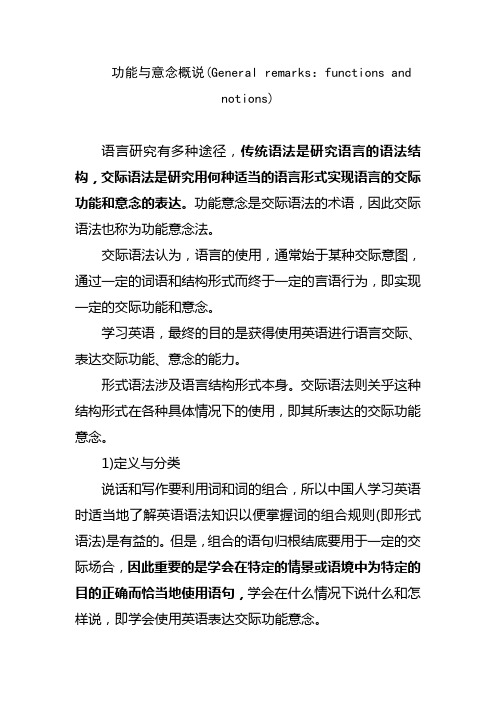
功能与意念概说(General remarks:functions andnotions)语言研究有多种途径,传统语法是研究语言的语法结构,交际语法是研究用何种适当的语言形式实现语言的交际功能和意念的表达。
功能意念是交际语法的术语,因此交际语法也称为功能意念法。
交际语法认为,语言的使用,通常始于某种交际意图,通过一定的词语和结构形式而终于一定的言语行为,即实现一定的交际功能和意念。
学习英语,最终的目的是获得使用英语进行语言交际、表达交际功能、意念的能力。
形式语法涉及语言结构形式本身。
交际语法则关乎这种结构形式在各种具体情况下的使用,即其所表达的交际功能意念。
1)定义与分类说话和写作要利用词和词的组合,所以中国人学习英语时适当地了解英语语法知识以便掌握词的组合规则(即形式语法)是有益的。
但是,组合的语句归根结底要用于一定的交际场合,因此重要的是学会在特定的情景或语境中为特定的目的正确而恰当地使用语句,学会在什么情况下说什么和怎样说,即学会使用英语表达交际功能意念。
话语的功能指使用语言去实现什么交际动机、做什么事情或进行什么言语行为。
像陈述、询问、评价、表态、建议、命令、请求、道歉、感谢、惊奇、表扬等都是常见的功能项目。
这样一些功能都带有普遍性即一般功能,可以体现在不同的具体情景之中,例如陈述与询问这两种信息交换的功能就可能出现在日常生活、工作、社交、通信、旅游等活动当中。
一般功能结合特殊的情景,便是话语的特殊功能领域,如某实验手段的表述、某基因突变的解释等。
意念指说话的内容所涉及的概念或话题。
按照抽象程度的不同,意念可分为一般意念和特殊意念。
前者如空间、时间、数量、质量、移动、关系等,后者如个人情况、家庭、学习、健康、衣服、计算机、汽车、节假日等等。
具体到医学,就有病人与实验对象的情况、肿瘤、基因表达、排斥反应、实验结果等等。
围绕着意念可以展现各种话语。
功能和意念这两种要素在实际的话语中是紧密结合、相互依存的。
新目标英语初中语法之“功能意念项目表”

◆社会交往(social communications)1.问候(greetings)Hi.Good morning/ afternoon / evening How are you?How are you doing?Please say hello to your parents. Please give my love / best wishes to her.HiHelloGood morning/ afternoon / eveningI am OK.Fine, thanks, and you?Very well, thank you.Just so so.Sure.All right.2.介绍(introduction)My name is Jim.I am a student.I am from England.This is Mr. / Mrs. / Miss. Brown.I’d like you to meet Bob.May I introduce Professor Jeff Brown/Hello.How do you do/Nice / glad / pleased to meet you.3.告别(farewells)Good bye / bye / bye-byeGood night.See you later / then / tomorrow / soon.I am sorry I have to go now.I am afraid I must be leaving now.Good bye / bye / bye-bye.See you.Good night.See you later / then / tomorrow / soon.4.感谢(thanks)Thank you very much.Thanks a lot.Thank you for your help.It’s very kind / nice of you.I appreciate your help.It’s a pleasure.My pleasure.That’s OK / all right.You are welcome.Don’t mention it.5.道歉(apologies)Sorry.I am sorry,Excuse meI beg your pardonI am sorry for losing your book I am sorry to interrupt youI am sorry that I am late That’s OKIt’s all rightNever mindIt doesn’t matterIt’s nothingForget it6.邀请(invitation)Would you like to go to a walk?You must come to dinner with me.May I invite you to dinner/What / how about having a swim?OKI’d like that, thanks.Yes, I’d love to.That would be very niceNo, thanks.It’s very nice of you, but my mother is ill I’d love to. But I am afraid I have no time I’m sorry I can’t, what about another time?7.请求允许(asking and permission)May I come in/Can / could I use your telephone?Would / do you mind if I open the window/Yes, pleaseSureCertainlyThat’s all rightOf course, you canI am sorry, it’s not allowedI am afraid notYou’d better not8.祝愿和祝贺(expressing wishes and congratulations) Have a good time / dayHave a good tripGood luckEnjoy yourselfBest wishes to youHappy New YearMerry ChristmasHappy birthdayCongratulationsWell doneThank youYou, tooThe same to you9.提供帮助(offering help)Do you want me to clean the room?Can I help you?Would you like me to help you/What can I do for you/Let me take your bagsYes, pleaseYes, thanksThank you, that would be fineThank you for your helpNo, thanksThank you all the sameThat’s very kind of you, but I can manage it myself 10.约会(making appointments)Will you be free tomorrow/Do you have time this afternoonHow about tomorrow morningWhen / where shall we meetCould we meet at 4:30Let’s meet at 4:30Yes, I will be free thenAll right, see you thenI’m afraid I have no time thenSorry, I won’t be free then, but I’ll be free tomorrow 11.打电话(making telephone)Hello, may I speak to himHello, I’d like to speak to sbIs that sb speakingCan I leave a messageI will call back laterI will ring her upHello, this is sb speakingHello, who is thatHold the lineJust a momentHello, who is speakingSorry, he isn’t here right nowCan I take a messageThe line is badI could n’t get throughSorry, I am afraid you have the wrong number 12.就餐(having meals)Would you like sth to eat / drinkWhat would you like to eatWould you like some more fishHelp yourself to some fishYes, I’d like a drinkI’d like rice and chickenJust a little, pleaseCan I have some more soupIt’s delicious, thank youI like green teaNo, thank youI’m full, thank you13.就医(seeing the doctors) What’s the matterDo you have a feverHow long have you been like this It’s nothing seriousTake this medicine three times a day You’ll be all right / wellI have a headache / coughI feel terrible / bad / awfulI don’t feel wellI have got a pain hereIt hurts hereI don’t feel like eating14.购物(shopping)Can I help youWhat can I do for youHow many / much would you like/What color / size / kind would you likeWhat about this oneHere’s your changeI’d like a pair of shoesHow much is it / are theyMay I try it onIt’s too big / smallSorry, it’ s too expensiveDo you have any other color / size / kindTwo and a half kilosThat’s fine, I’ll take itJust have a lookWell, I will think about it.15.问路(asking the way)Excuse me, where’s the washroomCan you tell me how to get to the post office Excuse me, which bus goes to world park Excuse me, which is the way to the bank of china Excuse me, could you tell me the way to the stationHow can I get to No.4 middle schoolIt’s over thereIt’s about 400 meters from hereGo down this street until you see the tall red building Turn right / left at the first crossing / cornerYou can’t miss itYou can take the No.13 busYou’d better take a taxiSorry, I don’t know. I am a stranger.16.谈论天气(talking about weather)What’s the weather like todayHow’s the weather in BeijingWhat a cold dayIt’s a nice / fine dayIt’s sunny/cloudy/windy/rainy/snowy/foggyIt’s getting cool/ cold /warm/hot17.语言交际困难(language difficulties in communication) PardonI beg your pardonI don’t understandSorry, I can’t follow youCan you speak more slowlyHow do you say ….. in EnglishI don’t know how to say that in English How do you spell itI am sorry I only know a little English18.提醒注意(reminding and warning) Don’t forget your raincoat Remember to lock the doorMind your headNo smoking’No spittingWet floorLook outBe carefulDon’t touchIt’s dangerous19.劝告(advice)You’d better go to see the doctorYou should listen to and read English everyday You need to buy a Chinese-English dictionary Don’t rushPlease stand in line20.建议(suggestions)Let’s go and have a lookHow / what about a picnic this SundayWhy don’t you buy a computerWhy not go to a movie◆态度(attitudes)1.同意和不同意(agreement and disagreement) SureCertainlyOf courseAll rightI agreeNo problemThat’s a good iceaYes, I think soNo wayOf course notI don’t agreeI don’t think soI am afraid not\2.喜欢和不喜欢(likes and dislikes)This book is very interestingI like/ love the movieI like / love to play computer gamesI like taking photosI enjoy listening to musicI am interested in scienceHe is fond of musicThis song is bad / awfulI don’t like the movie at allI don’t enjoy collecting stampsI hate to do homework3.肯定和不肯定(certainty and uncertainty) I’m sureI am sure of thatI am not so sureMaybe you are rightPerhaps she is at homeIt’s hard to say4.可能和不可能(possibility and impossibility)He can / may come todayIt may snow tonightIt’s possible to finish the homework before 6He may not come so earlyHe can’t be in the office nowIt’s not likely to snow soonIt’s impossible to finish my homework within one hour5.能够和不能够(ability and inability)He can ride a bikeHe is able to pass the math examHe is good at footballHe can’t swimShe is not good at swimming6.偏爱和爱好(preference and hobbies)I prefer teaWhich do you prefer, tea or coffeeI like English betterMy favorite subject is physics7.意愿和打算(intentions and plans)I will go with youI am going to see my headteacher this afternoon I’d like to make a call to her after classI want to find an English pen palI plan to go to hangzhou this summerI won’t see the movie againI am not going to buy the bookI don’t want to live in the big city8.希望和愿望(hope and wish)I wish to see you again’I hope to become a doctorI hope it stays fineI hope soI hope not9.表扬和鼓励(praise and encouragement) Very goodWell doneWonderfulExcellentYou speak English very wellYour dress is beautifulCome onKeep tryingYou can do itThank youOk, I will try it again10.责备和抱怨(blame and complaint) Why didn’t you tell me the truth11.冷淡(indifference)I don’t careIt doesn’t matter to me◆情感(emotions)1.高兴(happiness)How wonderfulThat’s lovely / great/ wonderfulI am so happyIt’s well doneI am pleased to know that2.惊奇(surprise)ReallyIs that so?What a surpriseHow nice to youI am surprised3.忧虑(worries)What’s wrongWhat’s the matterAnything wrongWhat should we doAre you worried about your health4.安慰(reassurance)Don’t be afraidDon’t worryIt’s all rightIt’s be ok5.满意(satisfaction)That’s fineThat’s good enoughI am pleased with you spoken English6.遗憾(regret)I’m so sorryWhat a shameIt’s a great pityThat’s too bad7.同情(sympathy)I’m so sorryI’m sorry about your illnessI’m sorry to hear you are going away8.恐惧(fear)HelpI’m afraid of that dogI am frightened9.愤怒(anger)Damn◆时间(time)1.时刻(point of time)Excuse me, what’s the timeExcuse me, what time is itWhen did you come to chinaWhat time do you get up every dayIt’s half past fiveI came to china in 1998I get up at 62.时段(duration)How long have you been in this school How long does it take you to get to school When did you live in BeijingHow long have you been illI have been in this school for three years It takes me twenty minutes by bikeI lived in Beijing from 1996 to 1999I have been ill since last Monday night3.频度(frequency)How often do you go to moviesI go to the movie once a weekI often go to movies4.时序(sequence)What did you do nextFinally we found our way outIt rained even harder later on◆空间(space)1.位置(position)Where is the pictureIt’s on/at/above/in/under/beside/near/behind the table He sits at the back of the roomThe lab is in the centre of the school2.方向(direction)Which is the way to the station?Where is the train goingWhere are you goingGo down this street, and turn left/ right at the first crossing The train is going to XianThe train is going to the east/west/south/northI’m going to the railway stationI’m leaving for shanghai3.距离(distance)How far is your school from hereIt’s about 40 minutes by bikeIt’s about 6 kilometers away◆存在(existence)1.存在(existence)Is there a bird in the treeAre there any apples in the treeWhat’s that in the tree?Yes, there is/ areThere is a bird in the treeThere are many / a lot of birds in the tree2.不存在(non-existence)Is there an English book in the schoolbagAre there any English books in the schoolbagIsn’t there any water in the bottleNo, there isn’t/ aren’tThere isn’t an English book in itThere aren’t any English books in the schoolbags No, there is no water in the bottleThere is no more paper in it◆特征(features)1.形状(shapes)What does it look likeWhat is the shape of the cloudsIt looks like a camelIt’s round/ long/tall/shortIt’s a circle2.颜色(color)What color is itIt’s green/red/blue/yellow/black/white/orange/purple/ light brown/dark blue3.材料(material)What’s the table made ofWhat’s the red wine made fromIt’s made of woodIt’s made from grapesI bought a woolen sweater yesterday4.价格(price)How much is the dictionaryHow much is itHow much are theyIs it cheap/expensiveThe dictionary costs 100 yuanThe dictionary is expensive/ cheap 5.规格(size)What size is your sweaterWhat size shoes do you wearThe size of my sweater is XXLIt’s too big/small/long/short for me6.年龄(age)How old are youHow old is he /sheI am eighteenHe/ she is six years oldUncle wang is an old man◆计量(measurement)1.长度(length)How long is the bridgeIt’s 430 metres2.宽度(width)How wide is the river?It’s about 200 metres wide3.高度(height)How tall / high is the buildingIt’s 130 metres tall / high4.数量(number)How many students are there in your class How much water do you drink every dayThere are forty students in our classI drink five glasses of water every day.◆比较(comparison)1.同级比较(equal comparison)My ruler is as long as yoursI can run as fast as youThis book is not as interesting as that oneI can’t run so fast as you can2.差别比较(comparative and superlative)Lily is younger than KateThe red skirt is more expensive than the yellow one I run faster than JimMrs. Li walks more slowly than Mrs. WangJim is the tallest in his classTom is the best of all3.相似和差别(similarity and difference)This picture is the same as than one on the wall Lucy is like her motherTom looks like his fatherMy picture is different from yoursThere are five differences between the two pictures◆逻辑关系(logical relations)1.原因和结果(cause and effect)Why are you late for calssBecause I got up late2.目的(purpose)Why are you here todayI came here to see you off◆职业(occupation)1.工作(job)What do you doWhat’s your jobWhat are you going to beI am a teacher/ doctor2.单位(employer)Where do you workI am teaching English in a high school.。
人教版新目标英语七年级上册全册要点讲解
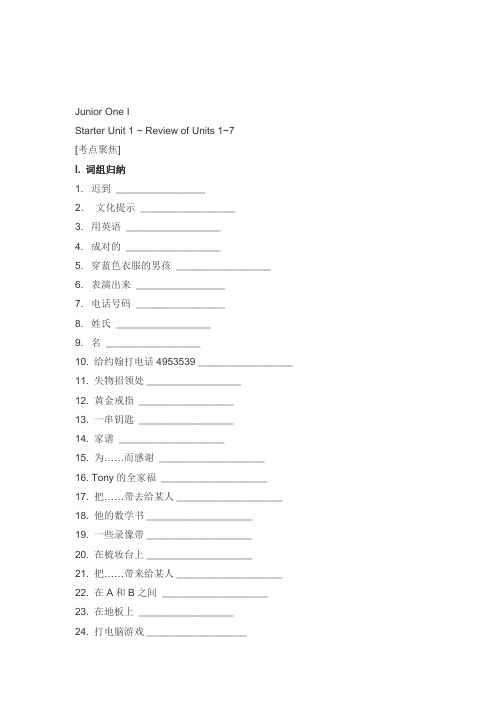
七年级英语上册全册要点讲解r One I1~7[考点聚焦]I. 词组归纳1. 迟到____2.文化提示__3. 用英语__4. 成对的__5. 穿蓝色衣服的男孩__6. 表演出来_7. 电话号码_8. 姓氏__9. 名__10. 给约翰打电话__11. 失物招领处__12. 黄金戒指__13. 一串钥匙__14. 家谱____15. 为……而感谢____16. Tony的全家福____17. 把……带去给某人____18. 他的数学书____19. 一些录像带____20. 在梳妆台上____21. 把……带来给某人____22. 在A和B之间____23. 在地板上__24. 打电脑游戏___25. 棒球球棒___26. 一个网球拍___27. 想做某事___28. 欢迎来到我们学校____29. 加入学校体育中心____30. 马上加入我们吧!____31. 丰富的体育用品收藏____32. 在电视上看篮球比赛____33. 跑步明星___34. 吃健康的食物___35. 就早餐而言___36. 食物清单___37. 一年的这个时候___38. 以一个非常优惠的价格__39. 各种颜色的毛衣__40. 出售__41. 看一下…… __42. 服装店__43. 篮球打得好__44. 非常喜欢…… __II. 句型归纳__ name?My name is Dale.__ your aunt?___ old.__ that?I Gs h?I r A.!G s good.?.__ you ___?W-A-T-C-H.r?r?98.e r?__ is.?e r.12. __e r?Yes, they are.t er?__.r ball?__.I I a s..?.?r s.III. 考点归纳n g. 嗨,埃丽。
早上好。
英文中常用的问候语及其回答:-.-H.― ――G ―G n g.―G ―G n oon.―G ―G n g.―G ―G .― ?― ?― ? ― you.高分突破:注意对“ ?” 和“ ?” 两句话的回答不要弄混淆。
功能意念大纲
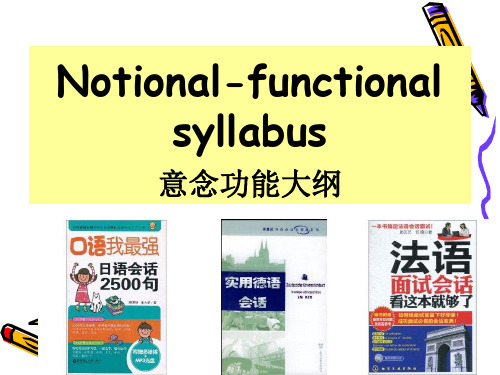
Distinguishing characteristic
• is its attention to functions as the organizing elements of a foreign language curriculum.
• Structure syllabus focus on grammar, and tend to highlight a grammatical features to the exclusion of practical application in real situation.
• notional-functional syllabuses Situations are devised to illustrate (显示,说明)grammar, instead of grammar illustrating a function, keys the students artificially(人为地) into grammatical categories that may later impede(阻碍) the communicative process. (P247 para3)
• For example, the "notion" of shopping requires numerous language "functions," such as asking about prices or features of a product and bargaining.
Structural syllabus & notionalfunctional syllabuses
冀教版英语七年级上册第十二课Let’s Go Shopping!教学设计
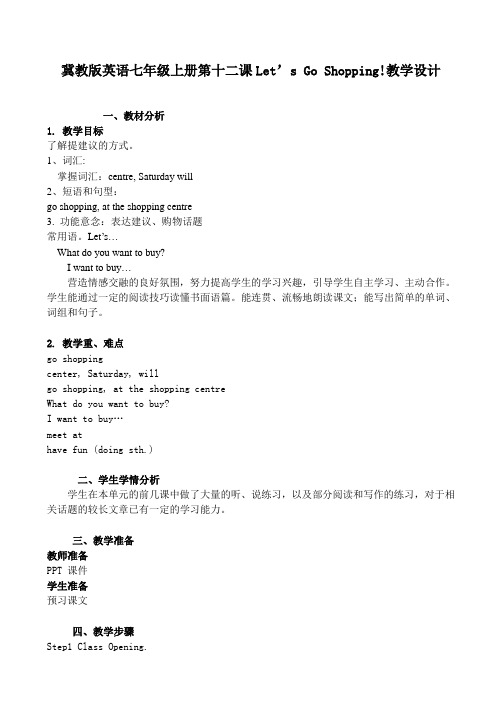
冀教版英语七年级上册第十二课Let’s Go Shopping!教学设计一、教材分析1. 教学目标了解提建议的方式。
1、词汇:掌握词汇:centre, Saturday will2、短语和句型:go shopping, at the shopping centre3. 功能意念:表达建议、购物话题常用语。
Let’s…What do you want to buy?I want to buy…营造情感交融的良好氛围,努力提高学生的学习兴趣,引导学生自主学习、主动合作。
学生能通过一定的阅读技巧读懂书面语篇。
能连贯、流畅地朗读课文;能写出简单的单词、词组和句子。
2. 教学重、难点go shoppingcenter, Saturday, willgo shopping, at the shopping centreWhat do you want to buy?I want to buy…meet athave fun (doing sth.)二、学生学情分析学生在本单元的前几课中做了大量的听、说练习,以及部分阅读和写作的练习,对于相关话题的较长文章已有一定的学习能力。
三、教学准备教师准备PPT 课件学生准备预习课文四、教学步骤Chant Colourful Clothes together, tell Ss most people like new clothes, when the clothes are too old or too small , what they would do. Lead the new content in.【设计思路】以chant的模式使学生放松,利用一些开放性的问题让学生自然地进入本课的学习。
Step 2 Introduction.Show the content Ss will get in this lesson.【设计思路】在每节课新授课开始前给学生展示本节课的重难点,有助于学生在学习中做到心中有数,也利于与之后的巩固总结环节相对应。
初中英语功能意念项目表学习资料

功能
提示
祝愿和祝贺 回答
Have a good day/ time Have a good journey/ trip. Good luck. Enjoy yourself. Best wish to you. Happy New Year. Merry christmas. Congratulations. Well done.
功能
提示
Would you like to go for a walk? May I invite you to dinner? What / how about having a swimming?
邀请
回答
1.OK.Thank you. Yes, I’d love to. That would be nice. 2.No, thank you. It’s very nice of you, but my mom is ill. I’d love to, but I have no time. I’m sorry I can’t .
功能
提示
Sorry. I’m sorry. Excuse me, please. I beg your pardon. I’m sorry (that ) I am late.
道歉
回答
That’s OK. It’s /That’s all right. Never mind. It doesn’t matter. It’s nothing. Forget it
功能
请示允许
提示
回答
May I come in? Can / Could I use your telephone? Would /do you mind if I open (my opening)the window?( 肯 : No , please/ Go ahead , please 不 介 意,开吧。否:I’m sorry , it’s
功能意念项目
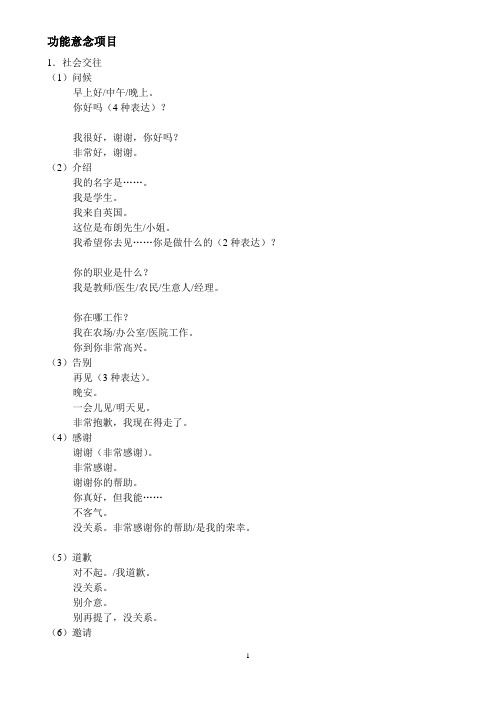
功能意念项目1.社会交往(1)问候早上好/中午/晚上。
你好吗(4种表达)?我很好,谢谢,你好吗?非常好,谢谢。
(2)介绍我的名字是……。
我是学生。
我来自英国。
这位是布朗先生/小姐。
我希望你去见……你是做什么的(2种表达)?你的职业是什么?我是教师/医生/农民/生意人/经理。
你在哪工作?我在农场/办公室/医院工作。
你到你非常高兴。
(3)告别再见(3种表达)。
晚安。
一会儿见/明天见。
非常抱歉,我现在得走了。
(4)感谢谢谢(非常感谢)。
非常感谢。
谢谢你的帮助。
你真好,但我能……不客气。
没关系。
非常感谢你的帮助/是我的荣幸。
(5)道歉对不起。
/我道歉。
没关系。
别介意。
别再提了,没关系。
(6)邀请你愿意一起散散步吗?游泳怎么样?是的,我愿意。
我很愿意,但恐怕……(7)请求允许我可以进来吗?我能用下电话吗?你介意我打开窗户吗?不介意,打开吧。
不介意(4种表达)。
恐怕不行。
最好别那么做。
(8)祝愿和祝贺玩得愉快/旅行愉快!祝贺你好运(2种表达)!玩得愉快!新年好!/你也是。
祝你生日快乐!祝贺你!(9)请求与提供帮助有什么能帮助你的吗?我能帮助你吗?/你能帮我一下吗?不,谢谢。
(10)约会明天有空吗?今天下午有空吗?我们什么时候(在哪儿)见面?4:30见面。
好的。
(11)打电话我能找……讲话吗?是……在讲话吗?谁在讲话?你好!我是……。
请等一会儿。
对不起,我听不清楚。
线路不通。
(12)就餐可以点菜了吗?你想吃什么?这是菜单。
你想吃/喝点什么?吃点鱼。
你想要什么样的果汁?味道非常好。
我付帐。
(13)就医你怎么了?你发烧了?你这种症状有多久了?一天吃三次这个药。
我头痛/咳嗽/发烧。
我脖子痛。
腿受伤了。
(14)购物能为你做点什么?我在寻找。
你喜欢什么颜色/尺码?我可以试穿吗?穿在你身上很好看。
你要多大尺码?S码。
好的,我买下了。
(15)问路打扰一下。
这是哪?你能告诉我去……怎么走吗?哪条路是去……?离这里大约400米。
两种初中英语教材功能意念项目对比分析
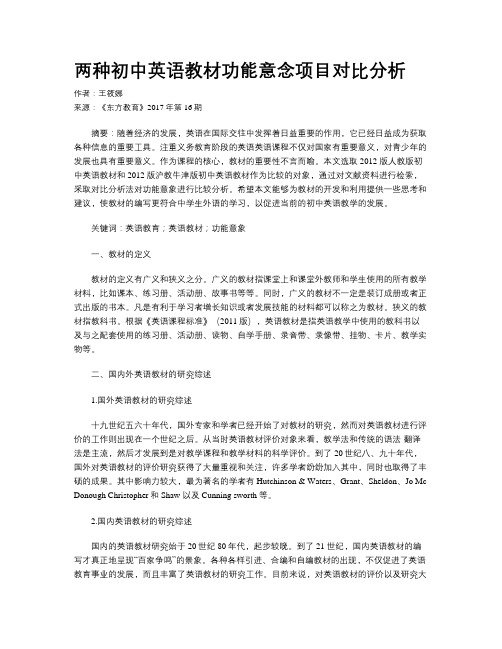
两种初中英语教材功能意念项目对比分析作者:王筱娜来源:《东方教育》2017年第16期摘要:随着经济的发展,英语在国际交往中发挥着日益重要的作用,它已经日益成为获取各种信息的重要工具。
注重义务教育阶段的英语英语课程不仅对国家有重要意义,对青少年的发展也具有重要意义。
作为课程的核心,教材的重要性不言而喻。
本文选取2012 版人教版初中英语教材和2012版沪教牛津版初中英语教材作为比较的对象,通过对文献资料进行检索,采取对比分析法对功能意象进行比较分析。
希望本文能够为教材的开发和利用提供一些思考和建议,使教材的编写更符合中学生外语的学习,以促进当前的初中英语教学的发展。
关键词:英语教育;英语教材;功能意象一、教材的定义教材的定义有广义和狭义之分。
广义的教材指课堂上和课堂外教师和学生使用的所有教学材料,比如课本、练习册、活动册、故事书等等。
同时,广义的教材不一定是装订成册或者正式出版的书本。
凡是有利于学习者增长知识或者发展技能的材料都可以称之为教材。
狭义的教材指教科书。
根据《英语课程标准》(2011版),英语教材是指英语教学中使用的教科书以及与之配套使用的练习册、活动册、读物、自学手册、录音带、录像带、挂物、卡片、教学实物等。
二、国内外英语教材的研究综述1.国外英语教材的研究综述十九世纪五六十年代,国外专家和学者已经开始了对教材的研究,然而对英语教材进行评价的工作则出现在一个世纪之后。
从当时英语教材评价对象来看,教学法和传统的语法-翻译法是主流,然后才发展到是对教学课程和教学材料的科学评价。
到了20世纪八、九十年代,国外对英语教材的评价研究获得了大量重视和关注,许多学者纷纷加入其中,同时也取得了丰硕的成果。
其中影响力较大,最为著名的学者有 Hutchinson & Waters、Grant、Sheldon、Jo Mc Donough Christopher和 Shaw 以及 Cunning sworth 等。
初中英语功能意念项目分解

初中英语功能意念项目表
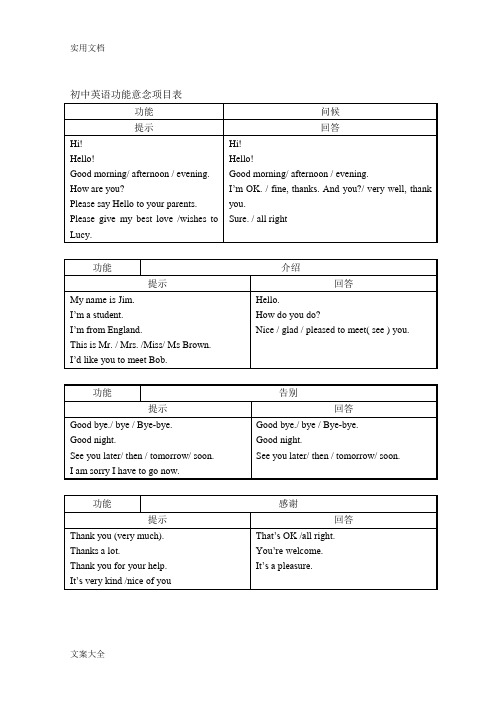
功能
问候
提示
回答
Hi!
Hello!
Good morning/ afternoon / evening.
How are you?
Please say Hello to your parents.
Please give my best love /wishes to Lucy.
Hi!
2.no, thank you.
It’s very nice of you, but my mom is ill.
I’d love to, but I have no time.
I’m sorry I can’t .
功能
请示允许
提示
回答
May I come in?
Can / Could I use your telephone?
I feel terrible /bad /awful.
I don’t feel well.
I can’t sleep well.
功能
购物
提示
回答
Can / may I help you?
What can I do for you?
How many/ much would you like?
What color /size/ kind would you like?
1.Yes, I’ll be free then.
All right. See you then.
2.I’m afraid I have no time then.
Sorry , I won’t be free then, but I’ll be free tomorrow.
中考英语功能意念项目表

中考英语功能意念项目表功能意念项目表(一) 社会交往(Social Communications)(1) 问候(Greetings)Please say hello to your parents.Please give my love / best wishes to Lucy.(2) 介绍(Introduction)This is Mr. / Mrs. / Miss / Ms Brown.(3) 告别(Farewells ) A.See you later / then / tomorrow / soon.I am sorry I have to go now.I am afraid I must be leaving now.(4) 感谢(Thanks ) A. Thank you for your help.It's very kind / nice of you.I appreciate your help.B. It's a pleasure.My pleasure.That's OK/ all right.You're welcome. Don' t mention it.(5) 道歉(Apologies) A. Sorry. I'm sorry.Excuse me, please.I beg your pardon.I' m sorry for losing your book.I'm sorry to interrupt you.I'm sorry (that) I'm late.B. That's OK.Thatt's all right. Never mind. It doesn't matter.It's nothing.Forget it.(6) 邀请(Invitation) A. Would you like to go for a walk?You must come to dinner with us.May I invite you to dinner?What / How about having a swim?B1. OK.Thank you.I'd like that, thanks.Yes, I'd love to.That would be very nice.B2. No, thank you.It's very nice of you, but my mother is ill.I'd love to, but I'm afraid I have no time.I'm sorry I can't. What about another time?(7) 请求允许(Asking for permission )A. May I come in?Can / Could I use your telephone?Is it all right if I sit here?I wonder if I could smoke here.Would / Do you mind if I open the window?B1. Yes, please. Sure. Certainly.Please do. That's all right. Of course, you can.Go ahead, please.B2. I'm sorry, it's not allowed.I'm afraid not. You'd better not.It' s not allowed.I'm sorry, but you can smoke in the next room.(8) 祝贺与祝愿(Expressing wishes and congratulations) A. Have a good day / time!Have a good journey / trip!Good luck!Enjoy yourself!Best wishes to you.Happy New Year!Merry Christmas!Happy birthday!Wish you all the success!Congratulations!Well done!B. Thank you.You, too.The same to you.(9) 提供帮助(Offering help)A. Do you want me to clean the room?Can I help you?Would you like me to help you?What can I do for you?Let me take your bags.B1. Yes, please. Yes, thanks.Thank you.That would be nice / fine.Thank you for your (the) help.B2. No, thanks / thank you.Thank you all the same.That's very kind of you, but I can manage it myself.(10) 约会(Making appointments ) A. Will you be free tomorrow?Do you have time this afternoon?How about tomorrow morning?When / Where shall we meet?Could we meet at 4:30?Let's make it 4:30.B1. Yes, I'll be free then.All right. See you then.B2. I'm afraid I have no time then.Sorry, I won't be free then. But I'll be free tomorrow.(11) 打电话(Making telephone calls ) A. Hello! May I speak to Tom?Hello! I'd like to speak to Mr. Green.Is that Liu Ying speaking?Can I leave a message?I'll call back later / again.I'll ring him / her up again.B. Hello! This is Mary speaking.Hello, who is this?Hold on, please.Just a moment, please.Hello, who's speaking?Sorry. He / She isn't here right now.Can I take a message?Sorry. I can't hear you.The line is bad / busy.I couldn't get through.Sorry, I'm afraid you have the wrong number.(12) 就餐(Having meals)A. Would you like something to eat / drink?What would you like (to have)?Would you like some more fish?Help yourself to some fish.Which do you prefer, rice or noodles?What would you like to drink, tea or coffee?B1.Yes, I'd like a drink.I'd like rice and chicken.Just a little, please.Can I have some more soup?It's so delicious. Thank you.I prefer noodles to rice. I like green tea. B2. No, thank you. I've had enough.I'm full, thank you.It's very delicious, but I can't eat any more.(13) 就医(Seeing the doctor) A. What's the matter?What seems to be the trouble?Do you have a fever?How long have you felt like this?It's nothing serious.Take this medicine three times a day.You'll be all right / well soon.Give up smoking and keep on taking more exercises. B. I have a headache / cough / fever.I feel terrible / bad / horrible / awful.I don't feel well.I've got a pain here.It hurts here.I don't feel like eating.I can't sleep well.(14) 购物(Shopping) A. Can / May I help you?What can I do for you?How many / much would you like?What colour / size / kind would you like?What about this one?Here's your change.B. I want /I'd like a pair of shoes.How much is it / are they?May I try it on?It's too big / small.Sorry, it's too expensive.Do you have any other colours / sizes / kinds?Two and a half kilos / pounds, please. That's fine. I'll take it.Just have a look.Well, I'11 think about it.(15) 问路(Asking the way) A. Excuse me. Where's the washroom?Can you tell me how to get to the post office?Excuse me. Which bus goes to World Park?Excuse me. Which is the way to the Bank of China?Excuse me. Could you tell me the way t6 the station, please? How can I get to No. 4 Middle School?B1. It's over there.It's about 400 metres from here.Go down this street until you see the tall red building. Turn right / left at the first / second crossing / comer. You can't miss it.You can take bus No. 103. You'd better take a taxi. ?B2. Sorry. I don't know. I'm a stranger here.(16) 谈论天气(Talking about weather) A. What's the weather like today?How's the weather in Beijing?What a cold / hot day today!It's a nice / fine / beautiful day today.B. It's sunny / cloudy / windy / rainy / snowy / foggy.It's getting cool / cold / warm / hot.(17) 语言交际困难(Language difficulties in communication) Pardon?I beg your pardon? I don't understand. Sorry, I can't follow you. Couldyou say that again, please?Could you repeat that, please? Can you speak more slowly, please?What do you mean by that?How do you say ... in English?I don't know how to say that in English.I don't know the word in English. How do you spell it, please? I'm sorry Ionly know a little English.(18) 提醒注意(Reminding and warning) Don't forget your raincoat.Remember to lock the door.Make sure that all the windows are closed.Mind your head/step!No smoking!No spitting!Wet floor!Look out!Be careful!Don't touch!It's dangerous!(19) 劝告(Advice)You'd better go to see the doctor.You should listen to and read English everyday.You need to buy a Chinese-English dictionary.If I were you, I'd phone him now.Don't rush / hurry/ push. Please stand in line.(20) 建议(Suggestions)Let's go and have a look.Should we go now?What / How about a picnic this Sunday?Why don't you buy a computer?Why not go to a movie?(二) 态度(Attitudes)(21) 同意和不同意(Agreement and disagreement) Sure. Certainly.That's correct.Of course. All right.I agree.No problem.That's a good idea.Yes, I think so.No way.。
- 1、下载文档前请自行甄别文档内容的完整性,平台不提供额外的编辑、内容补充、找答案等附加服务。
- 2、"仅部分预览"的文档,不可在线预览部分如存在完整性等问题,可反馈申请退款(可完整预览的文档不适用该条件!)。
- 3、如文档侵犯您的权益,请联系客服反馈,我们会尽快为您处理(人工客服工作时间:9:00-18:30)。
A: Mary, ↘is this your pencil?↗ B: Yes,↘ it is.↘ It's mine.↘ A: Are these your books?↗ B: No,↘ they aren't. ↘They're hers. ↘
属性
课标级别
2、5、8级(必填)
训练
听力或书面训练题(至少1题,必填,包括题目、答案和解 析,听力包括听力录音)
其他表意功能
此句具有的其他功能链接(选填)
属性
属性内容
生活中学生经常发生丢失物品或捡到物品的情况,引导学生利用寻物启事或失物招领来解决这类问题。
这是你的铅笔吗? (音频) Is this your pencil?↗ 一般疑问句。
2级 听句子, 选择最佳 答语(每小题1分,共 5分) ( )1. A. It’s a book. B. No, it isn’t. C.
1. Is that your backpack ? 2. How do
Yes, it’s a
you spell
backpack.
your
( )2. A. N-A-M-E. B.
name,
My name is Tom.
Tom?
C. T-O-M. ( )3. A. Yes, it is. B.
(音频)
3. Excuse me. Is this
No, I’m A. Excuse me.
baseball? 4. Your
B. Thank you. C.
说话人
通常这句话由谁说出来,如营业员、顾客、介绍人、被 介绍人等
会话范例
在某一场景下应用的对话(与上面场景对应,至少1段,必 填,内容包括对话文字内容、译文、朗读的音频)
典型应用场景 通常在什么场景下应用?(必填)
说话人
通常这句话由谁说出来,如营业员、顾客、介绍人、被 介绍人等
会话范例
在某一场景下应用的对话(与上面场景对应,至少1段,必 填,内容包括对话文字内容、译文、朗读的音频)
序号
一级分类
功能语句分类 二级分类
介绍(Introduction)
句子内容
Is this your pencil?
2
3
4 5 6 7 8 9 10
表意功能 译文 读音 语调分析 句子类型 对应语句 近似句型
场景应用1
场景应用2
属性项
属性说明
句子的用法(必填)
句子翻译
句子对应音频文件
语调标注
问句/答句/一般陈述(可多选) 相对应的问句或答句(与前一项关联,前项为问句或答 句,才有此项内容) 相同表意功能下近义句型的辨析(选填) 典型应用场景 通常在什么场景下应用?(必填)
答案:1-5 BCABA
Yes, it is.↘ No, it isn't.↘
Is that pencil yours?↗此句采用了名词性物主代词表达了相同的意思,比较难。 生活中学生经常发生丢失物品或捡到物品的情况,引导学生利用此句型来解决这类问题
常由拾到物品的人说。
A: Mary, is this your 玛丽,这是你的铅
pencil?
笔么?
(音频)
Bm在:iY捡nees到., it或is询. It问's 物品时是的,是我的。
(音频)
通常由捡到或询问物品的人说。
A: Are these your books?
这些是你的书吗? (音频)
B: No, they aren't. They're hers.
不是,是他们的。 (音频)
watch is
No, it’s blue. ( )5. A. It’s a pencil. B. That’s my pencil. C. This is
nice. 5. What’s that in English?
a pen. (系统自动搜索关联)
属性内容 物品的情况,引导学生利用寻物启事或失物招领来解决这类问题。
